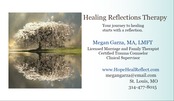|
First and foremost, it has been the case in our clinical practice that many Queer and Trans people who come to us for services are only hurt, angered, or feel cut off from their family members who choose to take actions such as not attending their weddings. As the person getting married did not choose and cannot change their sexual orientation or gender identity, family rejection does not send an actionable message to the person, just that family who object to their being out or in a marriage to a person of the same sex are incapable of seeing them for who they truly are and loving them as they are.
In our experience, people who may hold religious convictions that homosexuality is wrong or evil may feel as though they have the moral high ground in their family and social dynamics and may overlook the fact that LGBTQIA+ family members will object to their judgement and disdain and may cut them out of their lives as result. Just as we know there are correlations between Queer people not being able to be "out" as themselves or Trans people not being able to have their identified name and pronouns used and respected and the risk for depression and suicide, it stands to reason that parents of Queer and Trans children will cause often irreversible harm to their child's emotional well-being by choosing to put their own judgements in this area ahead of actions that communicate support and love. If you are someone who is not homophobic or disapproving of your Queer or Trans child, but simply feels less than comfortable due to lack of exposure to those communities, the concerns and values that your child likely holds, speaking from clinical experience, those adult children often just hope that their loved ones will do their best to communicate their love and support and be respectful and not say hateful/judgmental things or use dead names or incorrect pronouns. Many clients report that they are willing to accept that their family may not be capable of being completely open and affirming without reservation if their loved ones are willing to inform themselves, make an effort to see the world through their child's eyes, and not cut them off emotionally or financially when applicable. We recognize that, if you have an LGBTQIA+ child and are grappling with these questions, the likelihood that you would reject or disown them may be lower than the average, but we feel it is important to consider the impact that letting disrespect or even discomfort destroy one's most important relationships will often lead to sadness, loneliness, and regret. As therapists who support and align with the Queer and Trans communities, we are happy to meet with clients who may fall on either side of this dynamic and help them work through their feelings about the actions or identities of their loved ones in order to facilitate stronger individuals, families, and to continue to support the wonderful diverse nature and possibilities for the modern family. Author~Chris Scarberry, MA, LPC
0 Comments
As a family therapists we often run into clients or family of clients that are struggling with political and religious conflict with their family members from the LGBTQIA+ community, sometimes to the point where rejections, and cut offs are being considered. During the holiday season these conflicts tend to reach a fevered pitch, often being the driving force for many to begin/return to therapy. Adding another layer of complication, many individuals tend to get engaged over the holiday season, which prompts a flurry of spring weddings and pre-wedding angst. When the person getting married is your family member and the wedding is a gay/queer wedding, it may bring up a lot of emotions and turmoil over how to respond depending upon your level of acceptance of the entirety of who they are as a person. If you are someone who is struggling with determining what the best choice is for you, we've come up with some discussion points for the family of Queer loved ones to think about to help you gain clarity and hopefully some peace with your decision.
After taking time to read these questions, we suggest that you sit with yourself and notice your reactions. Did you notice any changes in your body as your reflected on them? Notice the questions that made you most uncomfortable and be curious and ask yourself why those questions brought on that reaction. Change is often uncomfortable, and we do a lot to resist change and return to homeostasis-where things were before and what we were most acclimated or used to. Sometimes discomfort shows up when we are at our learning edge, the place where we are challenged and struggle between our old beliefs and the introduction of new thoughts, feelings, or experiences that challenge them. We know sitting with your thoughts can be uncomfortable. One of the hardest things for folks during the pandemic was not having the usual distractions and being forced to sit with their thoughts (which had the unfortunate consequence of increasing substance abuse to re-bury these thoughts). Be kind to yourself. Let go of the judgment. Just notice and curious. If it helps, write down your thoughts to help you gain more clarity. Authors~Megan Garza, MA, LMFT & Chris Scarberry, MA, LPC |
AuthorSMegan Garza, MA, LMFT is a certified Specialist in Treating Trauma at a Supervisory level and is Licensed as a Marriage and Family Therapist. She specializes in work with sexual abuse survivors. Archives
June 2024
Categories |



 RSS Feed
RSS Feed